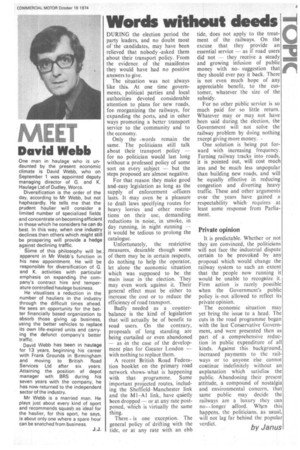Words without deeds
Page 45

If you've noticed an error in this article please click here to report it so we can fix it.
DURING the election period the party leaders, and no doubt most of the candidates, may have been relieved that nobody -asked them about their transport policy. From the evidence of the manifestos they would have had no positive answers to give.
The situation was not always like this. At one time govern ments, political parties and local authorities devoted considerable attention to plans for new roads, forreorganizing the railways, for expanding the ports, and in other ways promoting a better transport service to the community and to the economy.
Only the -words remain the same. The politicians still talk about their transport policy — for no politician would last long without a professed policy of some sort on every subject — but the steps proposed are almost negative.
For that reason they make good and-easy legislation as long as the supply of enforcement -officers lasts. It may even be a pleasure to draft laws specifying routes for heavy lorries and other restric tions on their use, demanding reductions in noise, in smoke, in day running, in night cunning -it would be tedious to prolong the catalogue.
Unfortunately, the restrictive measures, desirable though some of them may be in certain respects, do nothing to help the operator, let alone the economic situation which was supposed to be the main issue in • the election. They may even work against it. Their general effect must be either to increase the cost or to reduce the efficiency of road transport.
Badly needed as a counterbalance is the kind of legislation that will actually be of benefit to road users. On the contrary, proposals of long standing are being curtailed or even abandoned — as -in the case of the development plan for Gceater London — with nothing to replace them.
A recent British Road Federation booklet on the primary road network showswhat is happening with that programme. Some important projected routes, includ ing the Sheffield Manchester link and the MI-Al link, have quietly
been dropped or at any rate postponed, which is virtually the same thing.
There is one exception. The general policy of drifting with the tide, or at any rate with an ebb tide, does not apply to the treatment of the railways. On the excuse that they provide an essential service — as if road users did not — they receive a steady and growing infusion of public money with nosuggestion that they should ever pay it back. There is not even much hope of any appreciable benefit, to the customer, whatever the size of the subsidy.
For no other public service is so much paid for so little return. Whatever may or may not have been said during the election, the Government will not solve the railway problem by doing nothing except giving more money.
One solution is being put forward with increasing frequency. 'Fuming railway tracks into roads, it is pointed out, will cost much less and be much less unpopular than building new roads, and will be equally effective in reducing congestion and diverting heavy traffic. These and other arguments over the years have gained a respectability which requires at least some response from Parliament.
Private opinion
It is predictable. Whether or not they are convinced, the politicians will not face the industrial dispute certain to be provoked by any proposal which would change the railway system to such an extent that the people now running it would be unable to recognize it. Firm action is rarely possible when the Government's public policy is-not allowed to reflect its private opinion.
The economic situation may yet bring the issue to a head. The cuts in the road programme began with the last Conservative Government, and were presented then as part of a comprehensive reduction in public expenditure of all kinds. Against this background, increased payments to the railways or to anyone else cannot continue indefinitely without an explanation which satisfies the public. Abandoning their present attitude, a compound of nostalgia and environmental concern, that same public may decide the railways are a luxury they can nolonger afford. When this happens, the politicians, as usual, will not lag far behind the popular verdict.
by Janus




































































































